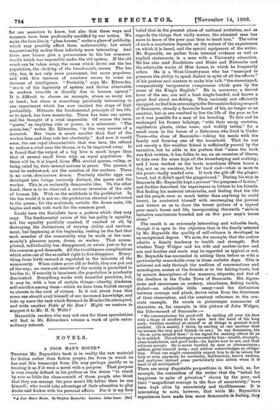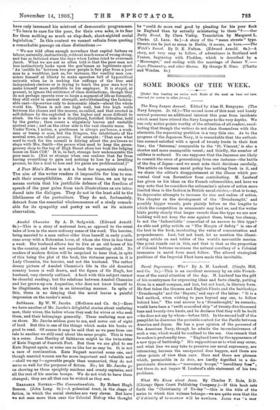NOVELS.
A POOR MAN'S HOUSE.*
TROUGH Mr. Reynolds's book is in reality the raw material for fiction rather than fiction proper, the form .in which he has cast this transcript from life may perhaps justify us in treating it as if it were a novel with a purpose. That purpose is very clearly defined in his preface as the desire " to check by ever so little the class-conceit of those people who think that they can manage the poor man's life better than be can himself ; who would take advantage of their education to play ducks and drakes with his personal affairs. For it is my firm • A Poor Man's Rouse. By Stephen Reynolds. London: John Lane. [Bs.] belief that in the present phase of national evolution, and as regards the things that really matter, the educated man has more to learn of the poor man than to teach him." The valve of such a conclusion depends on the nature of the experiences on which it is based, and the special equipment of the writer.
Mr. Reynolds, we gather from internal evidence as well as explicit statements, is a man with a University education. He has also read Bandelaire and Blake and Nietzsche and the admirable works of Miss Loane, to which he frequently refers. He is a West-Countryman who has "managed to preserve the ability to speak dialect in spite of all the efforts" of his pastors and masters to make him talk "the stereotyped, comparatively inexpressive compromise which goes by the
name of the King's English." He is, moreover, a devout lover of the sea, can sail a boat single-handed, and knows a great deal about sea-fishing. Thus variously and efficiently equipped, we find him returning to the Devonshire fishing seaport of Seacombe, already a favourite haunt of his, no longer as an amateur, but as one resolved to live the life of the poor as far as it was possible for a man of his breeding. To this end he exchanged his former lodgings, "with their smug curtains, aspidestria plants, china vases, and wobbly tables," for a small room in the house of a fisherman who lived in Under Town—the slum of Seacombe—taking his meals with the
family and forming one of the household. That he was not merely a fair-weather friend is sufficiently proved by the narrative, but he adds in his preface that " since the book was first written, it has fallen to me, on an occasion of illness, to take over for some days all the housekeeping and cooking; and I have worked on the boats sometimes fifteen hours a day, not as an amateur, but for bard and—what is more to the point—badly needed coin. It took the gilt off the ginger- bread, but it didn't spoil the gingerbread." During his stay in Seacombe Mr. Reynolds kept a journal" for purposes of fiction," and further described his experiences in letters to his friends. But finding his material intractable, and feeling that the life
and the people were so much better than anything he could invent, he contented himself with rearranging the journal and letters so as to draw the truest picture of a typical poor man's house and life, incorporating therewith "certain tentative conclusions founded not on this poor man's house
alone."
The result is an extremely interesting and valuable book, though it is open to the objection that in the family selected by Mr. Reynolds the quality of self-reliance is developed to an exceptional degree. We note, for example, that the author admits a family tendency to health and strength. But
whether Tony Widger and his wife and mother-in-law and son and brother and uncle may be regarded as typical or not,
Mr. Reynolds has succeeded in setting them before us with a particularity remarkable even in these realistic days. This is achieved not only through the medium of conversations and
monologues, scenes at the fireside or in the fishing-boats, but by minute descriptions of the manners, etiquette, and diet of the dwellers in the Under Town of Seacombe. His digres- sions and excursuses on cookery, cleanliness, fishing tackle, dialect—an admirable little essay-z-and the distinction between courage and pluck, derive value from the directness of their observation, and the constant reference to the con- crete example. He excels in picturesque summaries of character, as, for example, in this picture of John Widger,
the Uebermensch of Seacombe "He communicates his good-will by smiling all over his face with a tinge of mockery in his eyes and the bend of his long neck; whether mockery at oneself or at things in general is not evident. (It is mainly, I think, by smiling at one another that we remain the very good friends we are.) In any discussion, his Do as yu'm minded then!' is his signal for making others do as he is minded. The advantages possessed by him—health, strength, clear-headedness, and good looks—he knows how to use, and that without scruple. He is never hustled by man or circumstance ; seldom gives himself away ; and seldom acknowledges an obliga- tion. What one might reasonably expect him to do in return for help or even payment, he carelessly, deliberately, leaves undone, and performs instead some particularly nice action when it is least of all anticipated."
There are many disputable prepositions in this book, as, for example, the contention of the writer that the "talent for happiness in spite of privation" shown by the poor, and their " magnificent courage in the face of uncertainty," have been kept alive by uncertainty and thriftlessness. It is interesting to note, however, that while Mr. Reynolds's experiences have made him more democratic in feeling, they
have only increased his mistrust of democratic programmes. "To learn to care for the poor, for their own sake, is to fear for them nothing so much as slap-dash, short-sighted social legislation." In this context we cannot refrain from quoting a remarkable passage on class distinctions :—
" We are told often enough nowadays that capital fattens on labour, naturally, instinctively, w ithout much sense of wrong-doing, and has so fattened since the days when Laban tried to overreach Jacob. What we are not so often told is that the poor man not less instinctively looks upon the gen'leman as legitimate sport. An 'orrible lie' between two poor people is fair play from a poor man to a wealthier, just as, for instance, the wealthy man con- siders himself at liberty to make speeches full of hypocritical untruth when he is seeking the suffrage of the free and independent electors or is trying to teach the poor man how to make himself more profitable to his employer. It is stupid, at present, to ignore the existence of class distinctions; though they do not perhaps operate over so large a segment of life as formerly, they still exist in ancient strength, notwithstanding the fashion- able cant—lip-service only to democratic ideals—about the whole world kin. There is not one high wall, but two high walls between the classes and the masses, so-called, and that erected in self-defence by the exploited is the higher and more difficult to climb. On the one side is a disciplined, fortified Gibraltar, held by the gentry ; then comes a singularly barren and unstable neutral zone ; and on the other side is the vast chaotic mass. In Under Town, I notice, a gentleman is always geteleman, a work- man or tramp is man, but the fringers, the inhabitants of the neutral zone, are called persons. For example : ' That man what used to work for the council is driving about the genleman as stays with Mrs. Smith—the person what used to keep the green- grocery shop to the top of High Street afore her took the lodging house on East Cliff.' It is, in fact, strange how undemocratic the poor man is. (Not so strange when one realises that far from having everything to gain and nothing to lose by a levelling process, he has a deal to lose and his gains are problematical.)" A Poor Man's House is not a book for squeamish readers. The aim of the writer renders it impossible for him to con- sult their susceptibilities. At the same time, we are by no means certain that his justifiable defence of the freedom of speech of the poor gains from such illustrations as are intro- duced into the dialogue. They do not in the least add to the lifelikeness of the portraiture. They do not, fortunately, detract from the essential wholesomeness of a study remark- able for its sympathy and poetry as well as its minute observation.











































 Previous page
Previous page